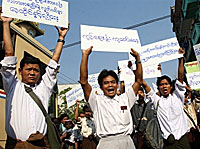




BANGKOK—A Burmese man who took part in a rare protest at the living conditions of ordinary people in the country was interrogated by police for two days non-stop before his release Tuesday.
“There were altogether nine of us, including Ko Htin Kyaw, arrested and then set free today,” Ko Tun Tun told RFA’s Burmese service.
“They started interrogating me about the roll of film in which I took pictures at the demonstration. Then they showed me a few photos of some political activists and asked me if I knew any of them. I said no, but they weren’t satisfied with my answer,” he told reporter U Sein Kyaw Hlaing.
The nine protesters were arrested after taking part in a demonstration of about 25 people in the former capital of Rangoon last Thursday.
Demonstrators called on Burma’s secretive military junta to improve health care, education, and economic conditions for ordinary people.
Tun Tun said the police appeared greatly concerned that the protesters had been engaging in “political activities,” and were possibly connected to opposition activists.
“They tortured me by questioning me for two days without a break by changing their turns, asking me different questions including my biography, about some friends and acquaintances, one after another,” he said
The nine protesters were released after signing an undertaking not to hold any future demonstrations without prior approval from the authorities.
Finally, they told us that if we wanted to demonstrate against countries like the United States or Britain we were always welcome to do so.
Interrogators had pressed Tun Tun for information on the funding of the group which organized the protest, calling itself the Burma Development Committee, he said.
“They told me not to demonstrate again without registration, not to form an organization which has to submit an application for a demonstration, then, only one can take part in it once approved.Then they forced us to sign,” he said.
But he was told that protests on topics not related to government failings would be far more sympathetically received.
“Finally, they told us that if we wanted to demonstrate against countries like the United States or Britain we were always welcome to do so,” said Tun Tun, who said the protest had taken a leaf out of the book of an anti-American demonstration by a handful of protesters in Rangoon earlier this month.
“I did explain to them that people who took part in this protest felt that since Ko Aye Lwin and that group had already protested in front of the U.S. and British embassies, it was now permitted to do so as long as it didn’t criticize the government or its policies, but just let the authorities know of their bitter plight,” he added.
The 30-minute demonstration last Thursday ended peacefully after police arrived.
Only one participant, identified as pro-democracy campaigner Htin Kyaw, was arrested at the scene, and the others were rounded up later. Three Burmese journalists were also detained for several hours.
The NLD said Tuesday it welcomed the release of the protesters “who had participated in the peaceful expression of people’s opinion.’’
The junta seized power after crushing the 1988 pro-democracy movement, refusing to step down even though Nobel Peace Prize winner Aung San Suu Kyi’s party won a landslide 1990 election victory.
Aung San Suu Kyi has spent nearly 11 of the last 17 years in detention, mostly under house arrest, despite worldwide calls for her freedom. Human rights groups say the junta is holding more than 1,100 political prisoners under brutal conditions.
Original reporting in Burmese by U Sein Kyaw Hlaing. Translated by U Ba Aung. Written and produced for the Web in English by Luisetta Mudie. Edited by Sarah Jackson-Han.